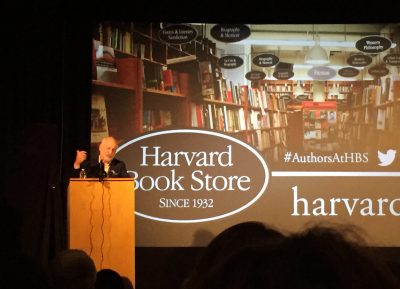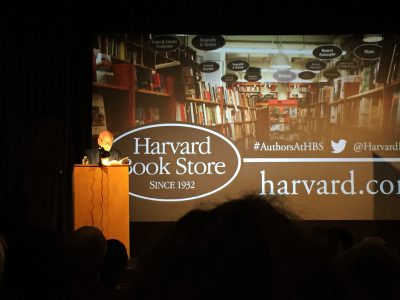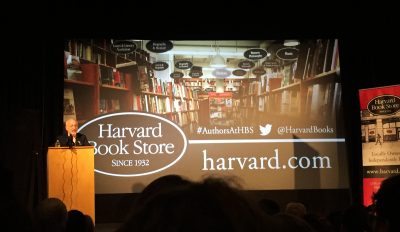Excerpts from André Aciman discussing Find Me, the sequel to Call Me By Your Name. The event was on November 11, 2019, hosted by the Harvard Book Store at the Brattle Theater.
Aciman is very fluent, charming, and sort of artfully self-deprecating.
On being back in Harvard Square, where he was previously a Ph.D. student in Comparative Literature; on nostalgia and the past
On familiar Harvard locations: “…many of which have disappeared, which is what happens when time goes by … many of which have good memories attached, many more of which have bad. If you have been a grad student, you know what I mean.”
“A nosteme is the smallest possible unit of return.” [The etymology of nostalgia is, nóst(os), a return home + algia, pain.]
“[Nostalgia] doesn’t mean that you are not excited about what the future will bring, but it does mean that you can find satisfaction in trying to call back that past. You may not be successful in bringing it back, but you can call it. … The past is always there.”
“Summons up the past and reappraises it or resituates it in the present”
Does he have a spot like Elio and Oliver’s? “There’s a wall, and it is not far from here. I went there this morning, and it still spoke to me. It happened 40 years ago, and the anniversary is coming up because it was in November.”
Civilization and Its Discontents – things built on ruins – “I think this is exactly how identity works… I don’t believe we have a core.”
“I have never had one identity. I have never been one thing.”
Egypt has lost its memory of its Jewish/multiethnic community. “We are rebuilding the Jewish temple, we want you back.” – Egyptian ambassador attempting to woo Aciman back to Alexandria
On conversations and perspective
“I can’t do plot! I like people who are stuck in a room together – not in the Jean-Paul Sartre manner – I hate Sartre – but they are in a café, or on a train, and having a conversation that interests me. Which is – what is each person trying to say to the other that they cannot?”
“Not the kind of dialogue you have with friends, but the kind of dialogue that is excavatory.”
Why do you think people react to the novel this way? “It is written in the first person, Elio’s perspective, and he is constantly reevaluating reality around him.” [Old French tradition of the analytical novel – Proustian tradition] “And it has no plot. It is about a boy desiring … another person. With some little bike rides thrown in.”
“I open a sentence and I let it go on, and I wish to god that you slip into it and you identify. You are trapped in that labyrinthine sentence and it becomes not my sentence, but your thought.”
[He’s thinking of writing from Elio’s mother’s perspective, in the first person.]
On the movie
[He thought that Michael Stuhlbarg’s speech as Elio’s father excelled beyond what was in the book; this has been much discussed in various interviews, particularly the new implication that Elio’s father specifically desired another man.]
Did you write a sequel because of the film? “No, it has nothing to do with the film… I wrote a sequel because I finished the book too hastily. This is going to sound peevish, but the only thing the movie gave me was the father’s name, Samuel. In the book, he is just ‘Professor P.’ I hate facts! This is the same reason I called the town ‘B.'”
On finding that the ending exceeded his expectations: “…and then the credits come, and I thought oh my god, that means the movie’s over, and that means Elio and Oliver will never get together again!”
On desire
Why is Oliver a man? (A phrasing I’ve borrowed from Robert Tobin’s essay about Death in Venice, “Why Is Tadzio a Boy?”) “I started CMBYN as a novel about a house that Monet painted… There was going to be a boy and a girl at a beach… But that doesn’t interest me. I wanted there to be a wall between them… but I wanted there to be ties between them that go over and above the boundary.”
On fathers & sons: “It’s as if they pass on not only their phobias, but also their obsessions.”
“Do you like the meadow for what it is, or are you already imagining yourself walking in the meadow? … I want to get lost, but I know that at a certain point that will stop.”
Misc.
“Music is not just a soundtrack for the book… Music is extratemporal. It hovers above the earth. Classical music causes you to become the best person you can be.”
He almost deleted the peach scene!!! He asked his editor what to do about it because he was embarrassed: “What if my sons read this?”


